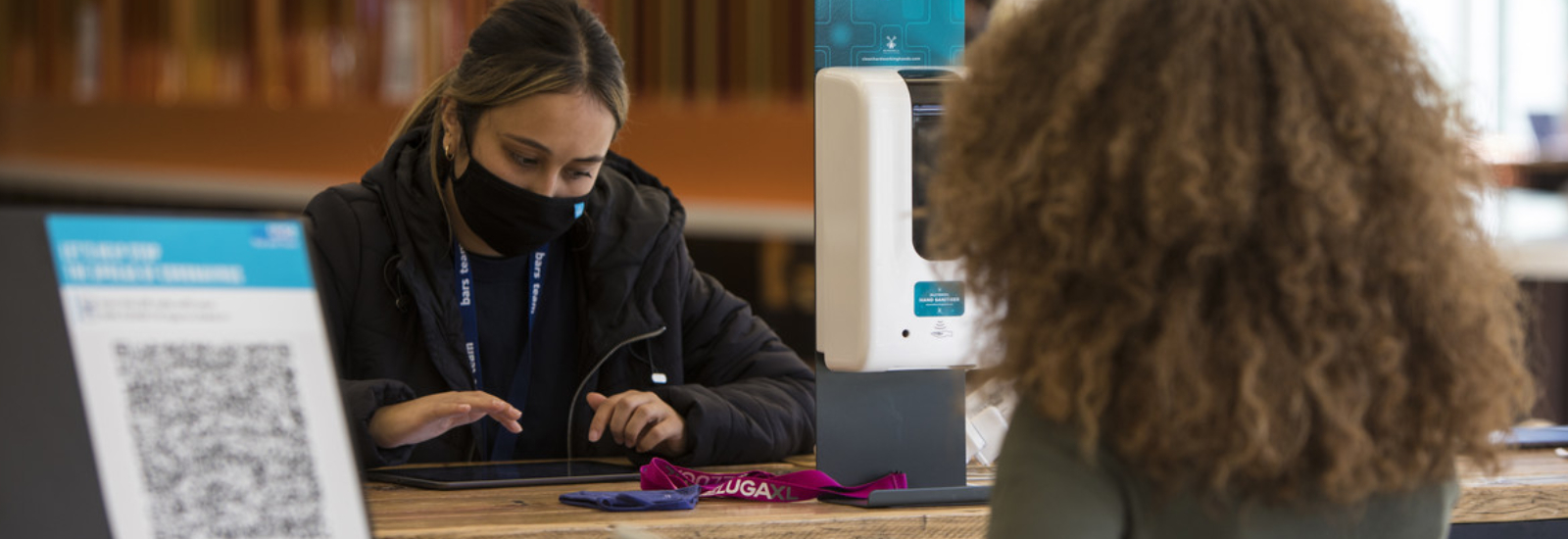On 14 October, the University of Reading established a COVID-19 Case Management Team, to deliver a dedicated contact tracing system for the University community. CONNECTED takes a look at how colleagues from across the University are supporting this work.
The University’s Case Management Team has been working closely with Public Health England (PHE) to support the NHS Test & Trace system, and help identify people at the University who have come into close contact with someone who has tested positive.
The team is led by Reading graduate Gurinder Singh, a lecturer in Reading’s School of Pharmacy and a practicing registered pharmacist, who previously volunteered for the national NHS testing scheme. Under his leadership, the team is made up of 29 volunteer staff from more than 12 different teams across the University.
The colleagues who have volunteered are taking time away from their usual ‘day’ jobs, providing support seven days a week.
 Edd Pickering, Head of Fundraising, and Agnes Gibson, Head of Campaign and Supporter Engagement from the Alumni & Supporter Engagement (ASEO) team, both volunteered to support this important work.
Edd Pickering, Head of Fundraising, and Agnes Gibson, Head of Campaign and Supporter Engagement from the Alumni & Supporter Engagement (ASEO) team, both volunteered to support this important work.
Edd said: “The reason I signed up for this work was that I’ve always believed if you feel something should be done then you should step up and do it. It’s so easy to read the news currently and feel down, sad, anxious and nervous, especially working in a sector very much in the thick of it.
“This work is a practical difference I can make to the fight against the pandemic. Yes it is tiring, and yes it is time-consuming, but it’s helpful.
“I’ve been really impressed with the rest of the team, and with the students I talk to. They are uniformly polite, keen to help and very aware of their responsibilities.”
 Agnes, who is helping Gurinder to run the team, said:
Agnes, who is helping Gurinder to run the team, said:
“The support and commitment from staff across the University, including a number of colleagues from ASEO, to take time out of their working week and at weekends to deliver this really crucial service makes me feel so proud of our community.
“The work is undertaken with enthusiasm and rigour, and everyone in the team is really happy to be involved and for their contributions to be making a difference.”
Agnes and Edd are also joined by Hem Grime, Ellen McManus-Fry and Laura Davis from the ASEO team, as well as volunteers from other departments around the University.
What does the team do?
As soon as the University is notified of a positive COVID-19 test for a student, the Case Management Team works with the person affected to give advice about when and for how long to self-isolate, based on government guidance, and how they can access support. They also signpost the pastoral support that is available to them, and work with the individual to identify and make contact with any members of the University community that they may have encountered prior to self-isolation.
Any student who receives a positive test result is allocated a Case Officer within Student Support Services, to keep in touch with them and their household to support their self-isolation. The Case Management Team work closely with the Case Officers to ensure students have access to food and other essentials, as well as making sure they don’t feel they’re going through this on their own.
One Reading student who had to self-isolate earlier this term said:
“At first we were all panicked, trying to email lecturers and book food delivery slots. However, as soon as we contacted the University we were offered a wide range of services to support us.”
Cases at the University
Initial data analysis from the team shows that the COVID-19 infection is dominated by transmission between students through household and social contacts rather than face-to-face teaching, which aligns with the government’s findings.
Gurinder said: “It was clear from an early stage that new cases were overwhelmingly linked with individuals living in the same household who had already tested positive. In almost all cases, individuals notifying us that they had tested positive had been self-isolating because someone in their household had already tested positive.”
Deputy Vice-Chancellor, Professor Parveen Yaqoob, said:
“It’s reassuring to see that face-to-face teaching does not present an identifiable risk and continues to provide the best environment possible so that our students can safely achieve their full potential.
“We know that many students, their families, colleagues and members of the local community have been worried by reports of high numbers of cases of COVID-19 on university campuses around the country, and may be confused as to why universities, including Reading, are staying open during lockdown and continuing to teach students in person.
“Our analysis suggests that the safety measures we have in place mitigate the risk of transmission in a teaching setting. Our Estates, Campus Services, Health & Safety and Technical Services teams have adapted buildings, classrooms and labs to provide a safe environment, which is regularly monitored, and students have helped enormously by following the guidance. Seating plans have been extremely helpful in facilitating contact tracing by the Case Management Team.”
While the team’s role is critically important to the safety of our community, there will be some delay between an individual first displaying symptoms, getting a test, and reporting it to the University. Therefore, it is still very important that we all follow the basic safety guidance to wash hands thoroughly and regularly, wear a face covering when around others outside our household and maintain social distancing.
Supporting safe travel
The government has asked for any students planning to travel for the Christmas break to do so after the current lockdown during a ‘student travel window’ from 3 to 9 December. The University is making detailed arrangements for mass testing with rapid results, so that any student or staff member can be tested for the coronavirus before they travel home, alongside other arrangements to reduce risks of transmission.
Students, colleagues and members of the public can call the University’s COVID-19 support line, 0118 214 7813, from 9am to 5pm on weekdays and 11am to 4pm at weekends if they have any queries about the University’s arrangements.
Discover more about the University’s COVID-19 Case Management Team and what motivated Gurinder Singh to get involved with this important initiative.




